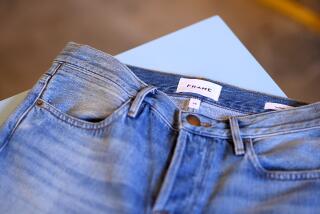Acid-Wash Patent Holders Targeting Deep Pockets of Jeans Makers
- Share via
Acid-wash jeans are being put to a litmus test.
The outcome could decide a burning issue in the denim business: Can anyone freely make acid-wash jeans? Or do jeans makers need to pay hundreds of millions in fees for the right to corrode pants and jackets?
The dispute, which involves past and future patent royalties, comes at a time when the popularity of acid-wash denims is, well, fading somewhat.
“It’s not a wash we even carry anymore,” said Nancy Rosen, a buyer for fashion-forward Judy’s Inc., a women’s apparel chain based in Van Nuys.
But, Rosen added, two or three years ago “when it was hot, it was incredibly hot. Everybody had to have acid-wash.”
And acid-wash clothes still are a very big seller at many less fashionable retail chains, continuing to account for an estimated 35% of U.S sales of denim pants this year.
Acid-washing fades denims in a variety of ways. On dark blue denim, it can add white splotches. On black denim, it provides a white “topping.”
Likewise, among different manufacturers, variations of the process have an array of names: blizzard wash, ice wash, powder wash and white lightening.
The two firms trying to enforce acid-wash patent rights say they are entitled to royalties from such U.S. jeans giants as San Francisco’s Levi Strauss & Co. and the East Coast firms that make Lee, Wrangler, Jordache and Gitano jeans. They claim that Levi Strauss alone owes $100 million in back royalties.
Waging the fight against the jeans makers are Golden Trade S.R.L. of Italy and its U.S. licensee, Greater Texas Finishing Co., an industrial laundry in El Paso, Texas. Golden Trade won a U.S. patent for acid-wash in 1988 and sold the exclusive U.S. rights to Greater Texas Finishing four months ago.
Soon afterward, Greater Texas Finishing notified jeans makers that they were violating patent rights and would need to pay up.
That drew some caustic comments from the jeans industry. Jordache Enterprises Chairman Joe Nakash scored Miles Rubin and Eric Rothfeld, the Stanford Law School-educated businessmen who own Greater Texas Finishing, for seeking “exorbitant” payments.
“It is unfair for American retailers and consumers to pay higher prices so that a couple of lawyers could make a killing on their purchases of the patent rights,” Nakash said in a recent news release.
Rothfeld replied that he has nothing to apologize for.
“We’re in an industry of opportunism and opportunity,” Rothfeld said. “Businesses aren’t in it for philanthropic purposes.”
Rothfeld added that he found it “peculiar” that a firm such as Jordache, which vigorously protects its own trademarks, would “fail to acknowledge and recognize someone else’s property rights.”
In fact, Rothfeld said it was concern that Greater Texas Finishing might be infringing on Golden Trade’s rights that prompted the El Paso firm to acquire licensing rights for acid wash in the first place.
The legal battle is shaping up largely as an argument over whether acid-washing meets the standards for a patent under U.S. law. Levi Strauss and Jordache haved filed suits in federal courts in Louisiana and Washington, D.C., to try to invalidate the existing patent, on the grounds that Golden Trade’s process was neither original nor a genuine advance.
“It’s an industry process that was available to any company before the patent was applied for,” argued Robert A. Spiegelman, a Jordache lawyer.
The process is roughly akin to the way many college students beat up their jeans using pumice stones and bleach. Still, Rothfeld describes acid washing as the work of a “genius inventor” and says that the patent covers the use of other types of stones and oxidizing agents, too.
SALES OF JEANS
An estimated 400 million pairs of denim pants are expected to be sold in the United States in 1990, with market shares divided as follows:
Acid wash: 35%
Stone wash: 30%
Pre-washed: 15%
Untreated blue jeans: 15%
Bleached: 5%
Source: Levi Strauss & Co.






